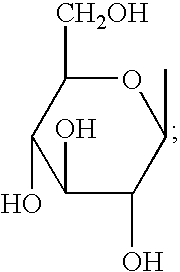Dicarboxylic acid ester derivatives of ginsenoside, pharmaceutical preparations containing the same, and preparation thereof
a technology ofdicarboxylic acid and ester derivatives, which is applied in the field ofdicarboxylic acid ester derivatives of ginsenoside, can solve the problems of restricting the utility of ginsenosides, low polarity of carbohydrate moieties, and poor water solubility
- Summary
- Abstract
- Description
- Claims
- Application Information
AI Technical Summary
Benefits of technology
Problems solved by technology
Method used
Image
Examples
example 1
Synthesis of CK Succinate
[0050] 401 mg of CK was dissolved in 35 ml of dried THF, and 257 mg (4 equivalents) of succinic anhydride was added to the resulting solution while stirring, to which 393 mg (5 equivalents) of 4-(dimethylamino)pyridine was then added. The reaction nixture was then heated under N2 at 40° C. for 48 hours. The reaction progress was monitored by reversed-phase TLC, and the solvent was removed by rotary evaporation until dryness, when the reaction was completed. The concentrate was added with ice water and ethyl acetate for partition. The resulting water layer was discarded, and the organic layer was repetitively extracted with water twice. The organic layer was then dried with anhydrous magnesium sulfate and rotary evaporated to dryness to obtain 369.7 mg of CK succinate derivatives mixture product.
[0051] The obtained product was analyzed by an analytic HPLC (GL Sciences Inc., Inertsil ODS-3V C-18; 3.0 mm×150 mm) where the mobile phase was 52% acetonitrile / H2O...
example 2
Synthesis of CK Succinate
[0052] 41 mg of CK and 40 mg (6 equivalents) of succinic anhydride were dissolved in 40 ml of dried Et3N. The resulting reaction mixture was then heated under N2 at 25° C. for 13 hours. The solvent was removed by rotary evaporation until dryness, when the reaction was completed. The concentrate was added with ice water and ethyl acetate for partition for at least three times. The organic layer was then dried with anhydrous magnesium sulfate and rotary evaporated to dryness to obtain 65.3 mg of a mixture product of CK succinate derivatives.
[0053] The obtained product was analyzed by a HPLC. The elution times of the main products separately were: 11.0 min (yield: 27.6%), 13.5 min (yield: 41.2%), 19.9 min (yield: 14.4%), 31.7 min (yield: 2.4%). A semi-preparative HPLC was used for purification separation, thereby obtaining 17.5 mg of 13.5 min product (GS-6), which was identified by MS as a CK mono-succinate derivative with a molecular weight of 723.44. Verifi...
example 3
Synthesis of CK Glutarate
[0054] 100 mg of CK was dissolved in 30 ml of dried THF, and 184 mg (10 equivalents) of glutaric anhydride was added to the resulting solution while stirring, to which 158 mg (8 equivalents) of 4-(dimethylamino)pyridine was then added. The reaction mixture was then heated under N2 at 60° C. for 23 hours. The reaction progress was monitored by reversed-phase TLC, and the solvent was removed by rotary evaporation until dryness, when the reaction was completed. The concentrate was added with ice water and ethyl acetate for partition for at least three times. The organic layer was then dried with anhydrous magnesium sulfate and rotary evaporated to dryness to obtain 135.6 mg of CK glutarate derivatives mixture product.
[0055] The obtained product was analyzed by a HPLC. The elution times of the main products separately were: 13.5 min (yield: 3.4%), 20.6 min (yield: 16.0%), 25.3 min (yield: 37.1%), 31.3 min (yield: 3.7%), 36.4 min (yield: 12.5%), and 51.4 min (y...
PUM
| Property | Measurement | Unit |
|---|---|---|
| concentration | aaaaa | aaaaa |
| concentration | aaaaa | aaaaa |
| concentration | aaaaa | aaaaa |
Abstract
Description
Claims
Application Information
 Login to View More
Login to View More - R&D
- Intellectual Property
- Life Sciences
- Materials
- Tech Scout
- Unparalleled Data Quality
- Higher Quality Content
- 60% Fewer Hallucinations
Browse by: Latest US Patents, China's latest patents, Technical Efficacy Thesaurus, Application Domain, Technology Topic, Popular Technical Reports.
© 2025 PatSnap. All rights reserved.Legal|Privacy policy|Modern Slavery Act Transparency Statement|Sitemap|About US| Contact US: help@patsnap.com



